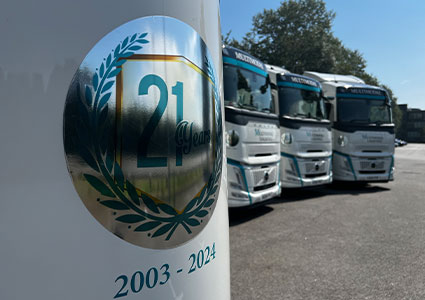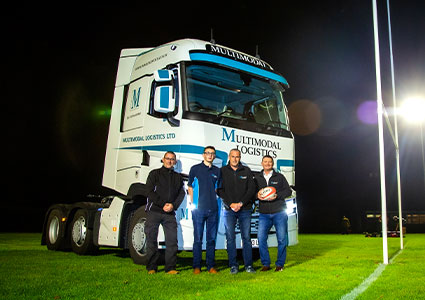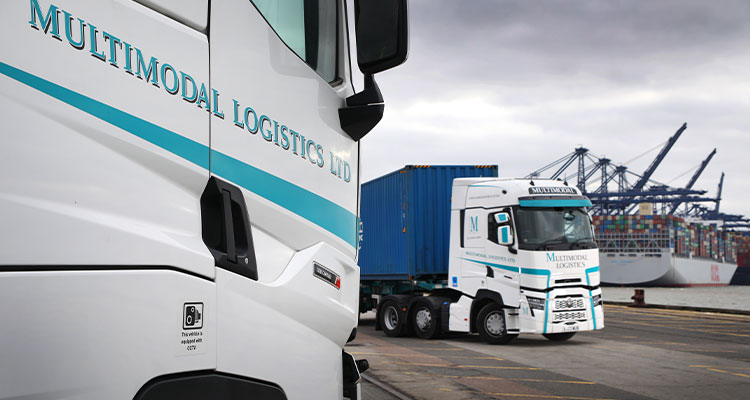Multimodal Logistics continues to deliver exceptional service while championing the sector and gearing up for growth
With over 21 years’ experience in freight transportation, Multimodal Logistics (MML) offers bespoke transport solutions for all of its customers. “Since 2013, we’ve initiated a project to run our own fleet of vehicles and move away from the ‘clearing house’ model that we had previously used,” begins Tim Wray, Managing Director. “We’re a specialist container haulage operator, dealing in logistical solutions for freight containers. Today, our fleet, which comprises 65 vehicles and will increase to 70 in November, is split equally between the South and North of England to service UK ports, making use of established inland rail hubs. Through our established road and rail network, we can move containers from any major UK port. We also offer a range of European road and rail transportation services through international rail centers within Europe. Together with our European business partners, we have the expertise and infrastructure to ensure our customers’ cargo arrives on time and is tracked along its journey.
 “Domestically, we deliver all types of cargo, both locally and nationally, from Cornwall to Scotland. We continue to invest in our fleet of own vehicles year on year. This time last year we had 53 trucks, and we will have 70 in November. When I first spoke to Transportation & Logistics International at the beginning of 2022, we had 37 trucks, which shows how we’ve progressively grown over the last few years. While that growth hasn’t always been straightforward, today, we’re the preferred supplier for many of our customers and are proud to deliver a consistent and reliable service.
“Domestically, we deliver all types of cargo, both locally and nationally, from Cornwall to Scotland. We continue to invest in our fleet of own vehicles year on year. This time last year we had 53 trucks, and we will have 70 in November. When I first spoke to Transportation & Logistics International at the beginning of 2022, we had 37 trucks, which shows how we’ve progressively grown over the last few years. While that growth hasn’t always been straightforward, today, we’re the preferred supplier for many of our customers and are proud to deliver a consistent and reliable service.
“In July this year, we bought five new Volvo FH Aero turbo compounds, which are probably amongst the most efficient internal combustion engine vehicles on the road and have proven to be great vehicles thus far. Whilst we are monitoring trends, we’re not currently at the stage of looking into battery or alternative fuel powered vehicles in the short-term future. The nature of our work and the distances we travel dictate the types of vehicles we need, and to get the payload and range we require, we must focus on the most efficient trucks capable of meeting our needs. That’s not to say that we’re not open to new technology; over the next four-to-five years, we’ll look to incorporate hydrogen powered technology into our vehicles, hopefully with an operational range comparable to diesel trucks. There’s a long way to go yet,” he explains, “and there’s a lot of developments still to be made and particularly within the UK.”
Sharing best practice
On a more personal note, Tim goes on to share his invitation to join the Road Haulage Association (RHA) board of directors. “In 2018 I was invited on the regional council for the RHA in the South and East of England, and through this I was approached in 2022 to join the board,” he shares. “The RHA is a member-driven business and chooses to have people from its membership as part of the board to guide and steer them in line with what the members need. There are three members of the executive team and up to three representatives from each region on the board.
“After sitting on the board for two years, I was nominated to the role of Vice Chairman in early 2024 and have been officially fulfilling these duties since July. I was also appointed to the role of Chair for the South and Eastern region at the same time. With almost 38 years’ experience working mainly in the container industry, being part of the RHA enables me to understand the common issues we are all facing across the wider transport community and to share ideas and best practice with others. I am proud to be part of an organization that can take real-life issues directly to Westminster and look to find solutions to help improve our industry and continue to promote the positive aspects of our sector.
“I get involved at various levels with different companies in different areas of the industry. It’s very fulfilling and brings a different pressure to the day job, but thankfully I can run it in parallel, as there are so many crossovers. It continues to increase my awareness of what’s going on in our industry, as well as promoting what we do daily. Transport and logistics are a backbone of this country; pretty much everything we have is transported by truck,” Tim continues.
thankfully I can run it in parallel, as there are so many crossovers. It continues to increase my awareness of what’s going on in our industry, as well as promoting what we do daily. Transport and logistics are a backbone of this country; pretty much everything we have is transported by truck,” Tim continues.
“Since the pandemic, we have continued to experience dramatic cost increases, particularly for equipment, trucks, and staff. There’s also huge pressure on rates, as well as increasing port and railhead costs through the introduction of container booking schemes making a stealth tax on our daily operation. We are timed at every point of the supply chain from collecting the container, delivering it and returning it, with financial penalties associated at every level. So, trying to manage that is a considerable aspect of our operation. Up until Easter this year, volumes in the UK were very low and many companies were struggling to make any financial gains. However, we have seen volume return despite an ever-changing supply chain due to vessel rotations and safety threats causing rerouting in the Suez Canal.
“We’ve seen an early Christmas boost in numbers,” he states. “While I’m not sure how long that will last, it is busier and has been a better quarter. For the rest of the year and moving into 2025, we will continue to invest in new vehicles and new business. We’re also branching out to customers in different areas. We do also want to look at other business opportunities outside of freight containers, but it must be customer led. It’s important that our customers see us as a reliable part of their own supply chain.
“Over the next five years, I hope to have doubled our vehicle fleet from our current 53 vehicles and be able to do so profitably. We’ll also start to look at technologies that can enhance our competitiveness. Our industry is faced with a huge number of challenges. I think if anyone remains in business over the next five years, they’ve done well. The big are getting bigger and the small are either giving up or are acquired by larger organizations. As volumes pick up, there will be increased demand for drivers, which is already very challenging, but you must always look to move forwards. So, if we’re able to double our fleet and remain profitable, I’ll be very happy with that.
“The UK is a massive consumer with a small manufacturing base. As such, we are dependent on goods being brought into the country and our sector delivers on that. I would like to see more recognition across the board, from the government down,” Tim concludes. “Our industry and its employees, especially our professional drivers who remain key workers, must be appreciated as we raise the profile of our sector.”
